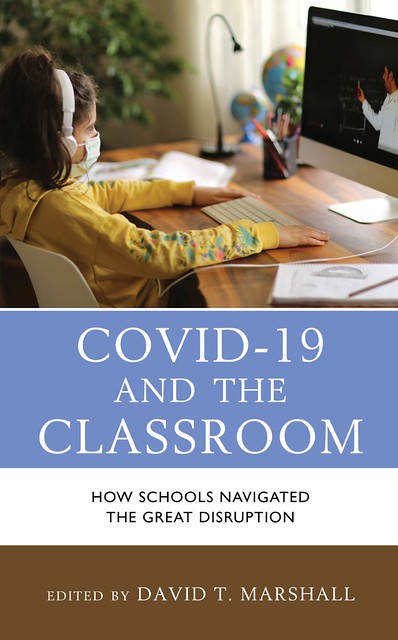Auburn professor helps pen book on COVID-19’s effect on K-12 education in United States
Article body
David Marshall, an assistant professor in Auburn University’s College of Education, has edited and contributed to a new book that examines the way schools in the United States navigated the COVID-19 pandemic.
The book, “COVID-19 and the Classroom: How Schools Navigated the Great Disruption,” is one of the first publications to provide research insight into the impact of COVID-19 on the K-12 educational system. The timeline covered in the book spans from the transition to remote learning in March 2020 throughout the 2020-21 school year. Marshall contributed five chapters of the book, as well as the introduction, and served as its editor.
“The book itself came about as a result of having engaged in a number of studies in 2020, and I was just trying to make sense of the impact COVID-19 was having on schools,” Marshall said. “I decided with a couple of colleagues that someone should capture this and maybe we should be the ones to do it.
“A central aim of ours was to give a voice to teachers and school leaders during this pivotal time.”
The book is divided into three main sections. The first examines how teachers, parents, school leaders and other educational stakeholders experienced the closing of schools and transition to remote learning, as well as the overall effects of the pandemic.
The second section takes on exploring the process of schools reopening within the United States and around the globe and the response from private schools. The final section focuses on how teacher preparation programs continued to operate throughout the crisis.
Marshall collaborated with colleagues throughout the country and abroad to conduct research for the book.
“I interviewed charter school leaders across the country from Hawaii to Boston just to understand how they were making decisions in terms of the way that they were navigating the pandemic with their schools,” Marshall said. “We did three rounds of surveys with teachers, and then a colleague of mine, Savannah Love at Randolph-Macon College, and I began a series of long-form interviews where we really dug in to capture what this experience was like for them.”
He worked with Love to interview teachers from different places and disciplines in order to gain a better perspective of the responses of educators around the country. They interviewed a calculus teacher from the Bronx, a special education teacher from Anchorage, Alaska, and a Spanish teacher from Colorado among others, just to provide a few examples of the diversity of teaching perspectives they encountered.
“Schools looked vastly different from one place to another,” Marshall said. “We intentionally looked at the geographic diversity and the learning modalities that were being implemented in their schools.”
Marshall found that the pandemic pushed schools toward the adoption of new educational technologies that will put them on a better footing for the future.
“Schools have historically been institutions that have been resistant to change,” Marshall said. “COVID-19 really required schools to react quickly and effectively to respond to the changing conditions that were brought on.
“For example, previously a lot of things were just pen, paper and hard copies, so you didn’t have a lot of the technological tools that schools now have to invest in. Having a learning management system wasn’t something that was commonplace in K-12, but now you have this digital infrastructure in place, and I think that’s actually a huge step for schools to be able to deal with future crises.”
David Shannon, the Humana-Germany-Sherman Distinguished Professor in Auburn’s College of Education, contributed to the book. Two of Marshall’s former students at Auburn, Sarah Woods Sharpe and Parinita Shetty, as well as two current Auburn students, Deja Trammell and Natalie Neugebauer, also contributed to the book.
“I think one of the things that was rewarding was getting to work with one of my colleagues, David Shannon,” Marshall said. “Also, just the chance to work with my current students and recent graduates who were students of mine, and to have them all as part of this project was something that was pretty special for me.”
The book, which is published by Lexington Books, an imprint of Rowman and Littlefield, was released Jan. 31 and may be found on Amazon and the Rowman and Littlefield website.
Related Media
Media interested in this story can contact Communications Director Preston Sparks at (334) 844-9999 or preston.sparks@auburn.edu.
Auburn University is a nationally ranked land grant institution recognized for its commitment to world-class scholarship, interdisciplinary research with an elite, top-tier Carnegie R1 classification, life-changing outreach with Carnegie’s Community Engagement designation and an undergraduate education experience second to none. Auburn is home to more than 30,000 students, and its faculty and research partners collaborate to develop and deliver meaningful scholarship, science and technology-based advancements that meet pressing regional, national and global needs. Auburn’s commitment to active student engagement, professional success and public/private partnership drives a growing reputation for outreach and extension that delivers broad economic, health and societal impact.






